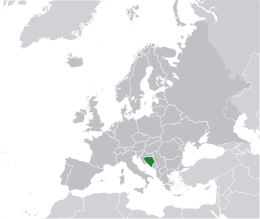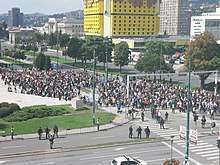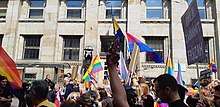LGBT rights in Bosnia and Herzegovina
Lesbian, gay, bisexual, and transgender (LGBT) persons in Bosnia and Herzegovina may face legal challenges not experienced by non-LGBT residents. Both male and female same-sex sexual activity are legal in Bosnia and Herzegovina. However, households headed by same-sex couples are not eligible for the same legal protections available to opposite-sex couples.
 | |
| Status | Legal since 1996 (Federation of Bosnia and Herzegovina), 1998 (Republika Srpska), 2003 (Brčko District) |
| Gender identity | Transgender people allowed to change gender |
| Military | Gays, lesbians and bisexuals allowed to serve |
| Discrimination protections | Sexual orientation, gender identity and intersex status protections (see below) |
| Family rights | |
| Recognition of relationships | No recognition of same-sex relationships |
| Adoption | – |
Bosnia and Herzegovina is a secular country composed of mainly Muslims and Christians (Catholic and Orthodox). While officially secular, religion plays an important role in Bosnian society. As such, attitudes towards members of the LGBT community tend to be quite conservative, much like other Eastern European countries.[1] Many LGBT events, most notably the 2008 Queer Sarajevo Festival, have ended in violence, after Islamic radicals attacked the crowds and chanted extremist phrases. According to a 2015 survey, 51% of LGBT Bosnians reported some form of discrimination directed against them, including verbal abuse, harassment and even physical violence.[2]
Nevertheless, attitudes are changing. In 2016, the Government approved a comprehensive anti-discrimination law, banning discrimination on account of one's sexual orientation, gender identity and sex characteristics. More and more gay bars and venues have opened, especially in the capital city of Sarajevo.[1] Bosnia and Herzegovina's desire to join the European Union has also played an important role in the Government's approach to LGBT rights.[3] The association ILGA-Europe has ranked Bosnia and Herzegovina 22nd out of 49 European countries in terms of LGBT rights legislation.[4]
Law regarding same-sex sexual activity
Bosnia and Herzegovina is governed by two political entities, the Federation of Bosnia and Herzegovina and Republika Srpska. Same-sex sexual activity was legalized in the Federation of Bosnia and Herzegovina in 1996 and in the Republika Srpska in 1998, by those two entities adopting their own criminal laws.[5] The Brčko District followed suit and legalized homosexuality in 2003.[6] The age of consent is 14, regardless of sexual orientation (having sexual relations with a person under 14 is considered statutory rape).[7]
Recognition of same-sex relationships
There is no legal recognition of same-sex couples on a national or subnational level. The Constitution of Bosnia and Herzegovina remains silent on gender eligibility for a marriage, and on a subnational scale, both entities, the Federation of Bosnia and Herzegovina and the Republika Srpska, limit marriage to opposite-sex couples, as prescribed by their respective family codes.[8]
On 19 October 2018, the Federation of Bosnia and Herzegovina (FBiH) adopted a request for the legalisation of civil unions. "The said item was on the session agenda and it was adopted in the same form as it was proposed," FBiH Prime Minister Fadil Novalić said. The Government will now form a working group to analyse the proposal, which will need to be later adopted by the Parliament.[9] According to research, about 80% of Bosniak same-sex couples wish to have their relationships recognised.
Discrimination protections
Article 12 of the Law on Equality of Sexes (Bosnian: Zakon o ravnopravnosti spolova), adopted in early 2003, prohibits discrimination based on gender and sexual orientation.[10] Sexual orientation is not explicitly defined, however.
The labour law of the Federation of Bosnia and Herzegovina (FBiH) also explicitly prohibits discrimination based on sexual orientation, as does Brčko District's labour law.[3]
The Law Against Discrimination (Bosnian: Zakon o zabrani diskriminacije) was adopted in 2009, prohibiting discrimination based on sex, gender expression and sexual orientation. Furthermore, the law forbids harassment and segregation on the basis of sexual orientation.[11] Article 2 of the law states as follows:[12]
Discrimination, in terms of this Law, shall be any different treatment including any exclusion, limitation or preference based on real or perceived grounds towards any person or group of persons, their relatives, or persons otherwise associated with them, on the grounds of their race, skin colour, language, religion, ethnic affiliation, disability, age, national or social background, connection to a national minority, political or other persuasion, property, membership in trade union or any other association, education, social status and sex, sexual orientation, gender identity, sexual characteristics, as well as any other circumstance serving the purpose of or resulting in prevention or restriction of any individual from enjoyment or realization, on equal footing, of rights and freedoms in all areas of life.
In July 2016, the Bosnian and Herzegovinan Parliament adopted a bill amending anti-discrimination laws to explicitly prohibit discrimination based on sexual orientation, gender identity and sex characteristics.[13][14]
Hate crime laws
In April 2016, the Federation of Bosnia and Herzegovina approved amendments to its Criminal Code by outlawing hate crimes on the basis of sexual orientation and gender identity. The law was published in the official gazette on 15 June 2016. Similar bans already existed in Republika Srpska and the Brčko District.[15][16][17]
Gender identity and expression
Transgender people may change their legal gender in Bosnia and Herzegovina after having undergone sex reassignment surgery and other medical treatments.[3][4]
Activism


Quite a few organizations have been working on LGBT rights in Bosnia and Herzegovina. Organisation Q (Udruženje Q) was the first LGBT organization to register in Bosnia and Herzegovina. Organization Q works for "the promotion and protection of culture, identities and human rights of queer persons", and was founded in September 2002. It formally registered in February 2004.[5]
Logos was initially registered at the end of 2005 under the name of the Initiative for Visibility of Queer Muslims (IIVQM), but shortly after changed its name to Logos and re-registered in 2006.[5] Equilibrium was registered in mid-2009 and was the first organization to work out of Banja Luka. Both organizations closed after two years.[3]
Other organizations include Okvir and Simosyon, which both registered in 2011, Viktorija, the Sarajevo Open Centre (Sarajevski Otvoreni Centar), BUKA (Banja Luka Association of Queer Activists; Bosnian: Banjalučko Udruženje Kvir Aktivista) which registered in 2013, LibertaMo Association, which began working in 2015, and the Mostar and the Tuzla open centers.[3][5]
Sarajevo Pride
The country's first pride event was held on 9 September 2019 in the capital Sarajevo.[18] An estimated 2,000 people marched in the first pride parade of Bosnia and Herzegovina, making the country the last former Yugoslavian nation to hold a pride event.[19]
Queer Sarajevo Festival 2008 incident
Approximately a dozen individuals were attacked at the end of the first day of the Queer Sarajevo Festival on 24 September 2008. Eight people, one policeman included, were reported to have been injured after a large group of Islamic fundamentalists and hooligans attacked visitors and the crowds. According to the organizers of the four-day event, police allowed a non-approved protest and anti-gay protestors to get too close to the venue thus endangering the participants.[20]
The festival, organised by Organization Q, opened in the Academy of Fine Arts in the centre of Sarajevo, the capital of Bosnia and Herzegovina. The attacks forced the organizers to make the rest of the festival a private event and to cancel it a couple of days later. Although Organization Q had organized public events before, this festival was the first cultural event of this kind in history of Sarajevo.[20]
In 2014, the Constitutional Court ruled that the authorities had failed to protect the freedom of assembly of the 2008 festival participants.[3]
2014 Merlinka Festival incident
On 1 February 2014, fourteen masked men stormed into the Merlinka Festival, shouting homophobic insults. Three participants were injured. Police arrived just after the attackers left, and were criticised for doing very little in finding and prosecuting the attackers.[21] The festival continued the following day, with no incident, and with the full protection of the police force.[4]
Public opinion
A 2015 survey found 44% of Bosnians would try to cure their child if he/she came out as gay. Another 11% stated that they would stop communicating with their child altogether. It also found 30% of Bosnia and Herzegovina's population supported granting same-sex couples some rights associated with marriage, such as economic and social rights.[3]
According to a Pew Research poll published in 2017, 13% of respondents in Bosnia and Herzegovina supported same-sex marriage, with 84% opposed. It showed that 82% of Bosnians believed that homosexuality should not be accepted by society.[22][23]
According to a poll published in 2019, before the first gay pride parade in Sarajevo, 33% of respondents supported the parade, with 58% against. 14% of respondents stated that they supported the legalisation of same-sex marriage, with 81% opposed. The poll was conducted in Sarajevo Canton, not covering the rest of the country.[24]
Summary table
| Same-sex sexual activity legal | |
| Equal age of consent | |
| Anti-discrimination laws in employment only | |
| Anti-discrimination laws in the provision of goods and services | |
| Anti-discrimination laws in all other areas (incl. indirect discrimination, hate speech) | |
| Hate crimes laws include sexual orientation and gender identity | |
| Same-sex marriages | |
| Recognition of same-sex couples | |
| Recognition of adoption for single people regardless of sexual orientation | |
| Stepchild adoption by same-sex couples | |
| Joint adoption by same-sex couples | |
| Gays, lesbians and bisexuals allowed to serve openly in the military | |
| Right to change legal gender | |
| Access to IVF for lesbians | |
| Commercial surrogacy for gay male couples | |
| Conversion therapy banned on minors | |
| MSMs allowed to donate blood |
References
- Bedford, Sam. "What's it Like to Be LGBT in Bosnia?". Culture Trip.
- "Gays in Bosnia still living life in the closet | DW | 27.10.2016". Deutsche Welle.
- BOSNIA AND HERZEGOVINA, LGBTI Equal Rights Association for Western Balkans and Turkey
- "Rainbow Europe". rainbow-europe.org.
- "Gay Life in Bosnia and Herzegovina". www.globalgayz.com.
- Bojan Bilić. LGBT Activism and Europeanisation in the Post-Yugoslav Space: On the Rainbow Way to Europe, Springer, 30 June 2016
- "Age of consent by country in Europe".
- "Cultural norms/beliefs about gender/sexuality that might lead to human rights violations, including discrimination" (PDF). Lib.ohchr.org. Retrieved 25 May 2016.
- "FBiH adopts request for legalisation of same-sex marriages". N1 BA.
- "LAW ON GENDER EQUALITY IN BOSNIA AND HERZEGOVINA" (PDF).
- "ZAKON O ZABRANI DISKRIMINACIJE" (PDF).
- "LAW ON PROHIBITION OF DISCRIMINATION". Organization for Security and Co-operation in Europe.
- "Better protection of LGBTI persons through the amendments to the Anti-discrimination Law of BiH". Soc.ba. 14 July 2016. Retrieved 4 January 2018.
- "Anti-discrimination law updated – great step forward in Bosnia and Herzegovina - ILGA-Europe". Ilga-europe.org. Retrieved 4 January 2018.
- "Federation of BiH finally adopts hate crime regulation". Sarajevski Otvoreni Centar. 1 July 2016.
- "CRIMINAL CODE OF THE FEDERATION OF BOSNIA AND HERZEGOVINA" (PDF).
- "THE CRIMINAL CODE OF REPUBLIKA SRPSKA" (PDF).
- "Solidarno za slobodu – slobodu okupljanja, slobodu identiteta i slobodu ljubavi! | Povorka Ponosa". Retrieved 8 September 2019.
- Mladen, Lakic (8 September 2019). "Bosnian Capital Hosts First-Ever Pride March". Balkan Insight. Sarajevo.
- "Eight injured as Sarajevo Queer Festival attacked". www.amnesty.org.
- "Bosnia and Herzegovina: Attack on LGBT Activists". Human Rights Watch. 4 February 2014.
- "Religious Belief and National Belonging in Central and Eastern Europe" (PDF).
- "Social views and morality". Religious belief and national belonging in Central and Eastern Europe. Pew Research Center. 10 May 2017.
- "Ekskluzivno objavljujemo: Povorku ponosa podržava trećina građana Sarajeva, većina je ipak protiv". klix.ba (in Bosnian). 6 September 2019.
External links
- "The Status of Lesbian, Gay, Bisexual and Transgender Rights in Bosnia and Herzegovina: A Shadow Report" (PDF). Global Rights.
- "Queer Sarajevo Festival 2008 digital stories on Vimeo".
- "World Report 2018 - Bosnia and Herezegovina". refworld.
- "Study on Homophobia, Transphobia and Discrimination on Grounds of Sexual Orientation and Gender Identity – Sociological Report: Bosnia-Herzegovina" (PDF). coe.int.
- "Study on Homophobia, Transphobia and Discrimination on Grounds of Sexual Orientation and Gender Identity – Legal Report: Bosnia and Herzegovina" (PDF). coe.int.
- "Official website of Organization Q" (in Bosnian).